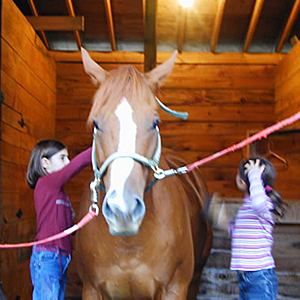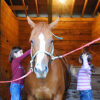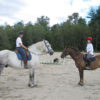
I run an EFP program and am responsible for the care of 8 horses, 3 dogs, and 2 cats. Lately, I have been thinking about the relationship I currently have with my animals compared to the relationships I had with my pets when I was younger. Not surprisingly, the quality of these relationships is very different today as I work more closely and spend more time with them than I did when I was a child. The biggest difference for me is my awareness of their various personalities and the closeness of our relationships. As I have explored this change, I have wondered what dynamic has shifted inside me and how has that happened. I believe that I have developed greater empathy for the animals under my care because of the nature of the work that we do together and the amount of time we spend with each other. As I have thought more and more about this idea, I have grown excited about its application to the work we do with our clients and the ability to capture this dynamic, describe it, and help others develop it.
So, what is empathy and how is it developed? Empathy is simply put the ability to recognize and experience emotion in others. How it is developed is a bit more complicated, but there are some key elements that must be in place for it to exist. First and foremost, we must be aware of our own feelings before we can be aware of another’s emotional state. Put another way – we can’t recognize that somebody else is angry if we don’t know what it feels like to be angry ourselves. In addition, we must be aware of nonverbal cues so that we can identify what anger might look like in somebody else. Lastly, we must be able to regulate our own emotions so that we can recognize and experience somebody else’s anger without becoming angry ourselves. There are many theories that help explain why some develop the ability to empathize with others and others do not. These theories include attachment theory, social learning theory, cognitive theory, object relations theory, as well as others. Although we are born with the capacity to develop empathy, it is our early childhood experiences and learning environment that help develop this ability.
The ability to empathize with animals is even more complicated. First and foremost, there must be a belief that animals have personalities and emotional states that we can empathize with. Some call this a belief in animal minds. Secondly, there must be an awareness of the species whether it be a dog, cat, horse, etc. and their general patterns of behavior. This includes their various nonverbal cues and the ability to interpret them accurately. If this piece isn’t there, anthropomorphism is developed. This is where people project their own stuff onto animals. It can be very handy when clients do this. Perhaps, not as much when clinicians do it.
In my earlier childhood experiences with my pony, I had a wonderful time riding him and playing with him. He was a friend who I enjoyed playing with. However, I never tried to really understand who he was as a horse or what he enjoyed. It was about me having fun. Not that I wasn’t kind to him. It was just that I never really asked him what he thought about what we were doing. Today I am very interested in how my horses feel about their work. Not only am I interested because I want them to be happy, but also because this information plays a big role in me helping my clients understand their own psychological and emotional development.
So, going back to my example of identifying anger in people, being able to identify anger in a horse or a dog would look very different. In order to truly empathize, we would not only need to identify the emotion of the animal, but also the cause. My Morgan Sam can become quite angry when I remove him from food. My quarter horse Oops can become angry when I tighten his girth. My springer spaniel Jack will get very angry when you try to take his bone. Each animal expresses their anger in a slightly different way and probably experiences it differently as well. Can I empathize with them in these moments? I know what it feels like to be angry and even though the animals may experience anger differently, we can still understand each other. However, it is important to acknowledge that we do experience anger differently. I’ll let the experts explore how our experiences are different. However, in order to have accurate empathy, it is important to recognize that our experiences are different from our animals. Despite that, we can still find enough similarity that we can empathize with their experience and react to it. I think this is an important component of creating a supportive relationship with our animals in this work.
How does empathy play out in EFP? I ask my animals to help me daily work with children who struggle with a variety of emotional and behavioral issues. In order for us to do this successfully, we need to have a supportive relationship with each other. My animals need to know that their feelings and opinions are heard and will be taken into account. I spend a lot of time in sessions voicing for the clients what the animals are saying. It helps the children recognize their various personalities and how they communicate their wants and needs. This is a critical part of what I do as it also deepens their connection with the animals. Through this experience, they can begin to recognize commonalities and differences with their own personalities and situations. We spend a lot of time talking about how the clients are similar or different from whichever animal they are engaging within that moment. Over time, they develop relationships with each individual animal and recognize how to engage with each one differently. They learn how to work with Sam when he’s upset about leaving his dinner because we talk about his feelings and how they are playing out in his behavior and how we should respond. Through these interactions, we are able to also talk about how to interact with peers or adults who may be frustrated or even ourselves. Through this work, we help children learn to develop empathy.
There is a lot of talk these days inside the EFP world about how we should work with our animals in an ethical way. However, I think these discussions lose sight of the relationship between clinician and animal and how important that is. Empathy is one component of this relationship. Although it is a significant one, I am sure that there are many others. I would love to use this space to explore these ideas. What other components are critical in our relationships with our animals?


